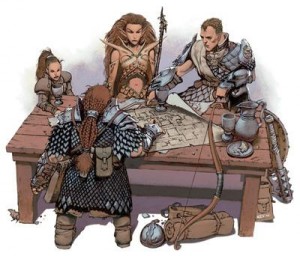On Friday we comb through our extensive archives to find an older article that we feel deserves another look. From February 8, 2011, Dungeon’s Master once again presents: 5 Tips To Increase Role-Playing At Your Game Table.
Role-playing has featured prominently in several 4e blogs over the past few weeks. The topics and approaches to the subject have varied widely, from how to speed up combat to allow for more time to role-play to introducing new mechanics to encourage role-playing. Our own post on the 4th action is one of the later articles. The subject of role-playing in 4e has been of great debate since its release with many debating how much role-playing the edition allows.
Some have argued that skill challenges are the mechanic in 4e that facilitates role-playing. While skill challenges can certainly accomplish this task, to state that they are the only way to role-play in 4e is rather naive. I strongly believe that if your gaming group wants to role-play it will. I also believe that some players are more willing to embrace role-playing than others.
Role-playing can be an uncomfortable experience for some players. It requires taking on an alternate personality and sharing that with the rest of the game table. Included below are five tips that a DM can use to foster role-playing at the table.
